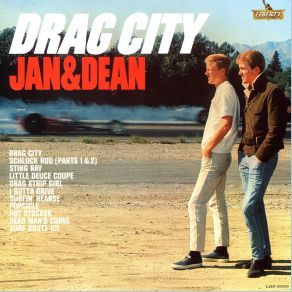Drag City
Download links and information about Drag City by Jan & Dean. This album was released in 1964 and it belongs to Hip Hop/R&B, Soul, Rock, Rock & Roll, Pop genres. It contains 12 tracks with total duration of 30:29 minutes.

|
|
|---|---|
| Artist: | Jan & Dean |
| Release date: | 1964 |
| Genre: | Hip Hop/R&B, Soul, Rock, Rock & Roll, Pop |
| Tracks: | 12 |
| Duration: | 30:29 |
| Buy it NOW at: | |
| Buy on iTunes $9.99 | |
| Buy on Amazon $0.99 | |
| Buy on Amazon $9.49 | |
| Buy on Songswave €0.85 | |
| Buy on Songswave €0.84 | |
Tracks
[Edit]| No. | Title | Length |
|---|---|---|
| 1. | Drag City | 2:22 |
| 2. | I Gotta Drive | 2:40 |
| 3. | Drag Strip Girl | 2:37 |
| 4. | Surfin' Hearse | 2:42 |
| 5. | Dead Man's Curve | 2:47 |
| 6. | Schlock Rod, Pt. 1 | 2:39 |
| 7. | Schlock Rod, Pt. 2 | 2:59 |
| 8. | Popsicle Truck | 2:36 |
| 9. | Surf Route 101 | 2:03 |
| 10. | Sting Ray | 2:16 |
| 11. | Little Deuce Coupe | 2:02 |
| 12. | Hot Stocker | 2:46 |
Details
[Edit]Drag City has been described by Dean Torrence as Jan & Dean's first concept album, with all of the songs written or chosen around a very specific theme. Predictably for such a made-to-order effort, the material is a little uneven (who in music would have 11 or 12 first-rate car songs just sitting around waiting to be recorded?) but the music is first-rate. Alongside the title hit, which was the duo's first attempt at a car song, are numbers that vary from the cool ("I Gotta Drive" "Surfin' Hearse") to the delightfully silly ("Popsicle Truck," which became a hit three years later as "Popsicle"), through the odd, forgettable tune ("Drag Strip Girl" which — no joke — drags too much), to the ridiculous ("Schlock Rod, Pts. 1 & 2"), which introduced the first overt humor to a Jan & Dean album. And then there was "Dead Man's Curve," a conceptual track with 18 vocal parts, and an orchestra that included strings and French horns, as a production. No one appreciates it now, but "Dead Man's Curve" led the way in complexity and seriousness in a pop record at the time, transcending Phil Spector's work and establishing the budgetary and production beach-head on which Brian Wilson would land with Pet Sounds, "Good Vibrations," and SMiLE starting three years later. Most of what is here is easy to appreciate simply as fun, however, celebrating the delights of fast cars, surfing, fast women, and surfing with fast women. One has to admire the poetic dexterity that went into "Hot Stocker" with its inventory of the engine and drive train that make the title vehicle special. The playing, as always, is first-rate, with most of L.A.'s top players from Hal Blaine on down here to do their level best, which is considerable, on numbers like "Sting Ray" (a throwaway instrumental that's just too good to throw away) and covers of "Little Deuce Coupe." Brian Wilson, Roger Christian, and Barry Mann contributed to the songs and, in Wilson's case, sang backup as well.